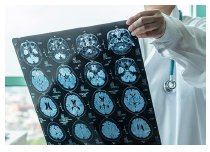Perelman School of Medicine and NIH to use AI in Alzheimer’s Research
Trend Watch: AI Tools Benefit Oncology, Alzheimer’s and COVID-19 Space
 Researchers at the Perelman School of Medicine at the University of Pennsylvania are collaborating with 11 research centers to determine more precise diagnostic biomarkers and drug targets for Alzheimer’s disease. With a $17.8 million grant from the National Institute on Aging at the National Institutes of Health, the teams will apply advanced AI methods to integrate and find patterns in genetic, imaging, and clinical data from more than 60,000 Alzheimer’s patients — representing one of the largest and most ambitious research undertakings of its kind.
Researchers at the Perelman School of Medicine at the University of Pennsylvania are collaborating with 11 research centers to determine more precise diagnostic biomarkers and drug targets for Alzheimer’s disease. With a $17.8 million grant from the National Institute on Aging at the National Institutes of Health, the teams will apply advanced AI methods to integrate and find patterns in genetic, imaging, and clinical data from more than 60,000 Alzheimer’s patients — representing one of the largest and most ambitious research undertakings of its kind.
“Brain aging and neurodegenerative diseases, among which Alzheimer’s is the most frequent, are highly heterogeneous," says Penn Medicine’s Christos Davatzikos, Ph.D., a professor of radiology and director of the Center for Biomedical Image Computing and Analytics. “This is an unprecedented attempt to dissect that heterogeneity, which may help inform treatment, as well as future clinical trials."
Diversity within the Alzheimer’s patient population is a crucial reason why drug trials fail, according to the Penn researchers.
“We know that there are complex patterns in the brain that we may not be able to detect visually," says Li Shen, Ph.D., a professor of informatics. “Similarly, there may not be a single genetic marker that puts someone at high risk for Alzheimer’s, but rather a combination of genes that may form a pattern and create a perfect storm. Machine learning can help to combine large datasets and tease out a complex pattern that couldn’t be seen before."
The project’s first objective will be to find a relationship between three modalities — genes, imaging, and clinical symptoms — to identify the patterns that predict Alzheimer’s diagnosis and progression and to distinguish between several subtypes of the disease. The investigators will use those findings to build a predictive model of cognitive decline and Alzheimer’s disease progression to steer treatment for future patients.
This undertaking will also utilize data from the Alzheimer’s Disease Sequencing Project, an NIH-funded effort led by Gerard Schellenberg, Ph.D., and Li-San Wang, Ph.D., at Penn, along with colleagues from 40 research institutions.
Drs. Davatzikos and Shen will collaborate with three co-principal investigators at the University of Southern California, the University of Pittsburgh, and Indiana University for the five-year project.
Xilinx, Spline.AI Use AWS to Push COVID-19 Prediction
Xilinx, in partnership with Spline.AI, has launched a fully functional medical X-ray classification deep-learning model and a reference design kit on Amazon Web Services (AWS).
The newest solution has been used for a pneumonia and COVID-19 detection system, with high levels of accuracy and low inference latency.
To train the deep-learning models, team members leveraged more than 30,000 curated and labeled pneumonia images and 500 COVID-19 images.
Under the partnership, the companies jointly developed solutions that leverage an open-source model, running on a Xilinx Zynq UltraScale+ MPSoC device, on a Python programming platform.
The solutions developed under the partnership can be used by the researchers for different applications and adapted for specific requirements, says Xilinx.
The open-source design can be used by medical diagnostic, clinical equipment makers, and healthcare service providers for various clinical and radiological applications in a mobile, portable, or point-of-care edge device with the option to scale using the cloud.
The artificial intelligence (AI) model of the solution is trained using Amazon SageMaker and is deployed from cloud to edge using AWS IoT Greengrass.
The solution is said to facilitate remote machine learning model updates, geographically distributed inference, and the capability to scale across remote networks and large geographies.
Regina Barzilay Wins $1 Million Association for the Advancement of Artificial Intelligence Squirrel AI Award
 The world’s largest AI society — the Association for the Advancement of Artificial Intelligence (AAAI) — has awarded its inaugural Squirrel AI Award for Artificial Intelligence for the Benefit of Humanity, a $1 million award, to Regina Barzilay, the Delta electronics professor of electrical engineering and computer science at MIT and a member of MIT’s Computer Science and Artificial Intelligence Laboratory (CSAIL). According to AAAI awards committee chair Yolanda Gil, this award aims to be unique in recognizing the positive impact of artificial intelligence for humanity.
The world’s largest AI society — the Association for the Advancement of Artificial Intelligence (AAAI) — has awarded its inaugural Squirrel AI Award for Artificial Intelligence for the Benefit of Humanity, a $1 million award, to Regina Barzilay, the Delta electronics professor of electrical engineering and computer science at MIT and a member of MIT’s Computer Science and Artificial Intelligence Laboratory (CSAIL). According to AAAI awards committee chair Yolanda Gil, this award aims to be unique in recognizing the positive impact of artificial intelligence for humanity.
Prof. Barzilay is being recognized for her work developing machine learning models to develop antibiotics and other drugs, and to detect and diagnose breast cancer at early stages.
Since surviving breast cancer in 2014, Prof. Barzilay has increasingly focused her efforts on healthcare. She created algorithms for early breast cancer diagnosis and risk assessment that have been tested at multiple hospitals around the globe, including in Sweden, Taiwan, and at Boston’s Massachusetts General Hospital. She is now working with breast cancer organizations such as Institute Protea in Brazil to make her diagnostic tools available for underprivileged populations around the world. She realized from doing her work that, if a system like hers had existed at the time, her doctors actually could have detected her cancer two or three years earlier.
In parallel, she has been working on developing machine learning models for drug discovery. With collaborators, she’s created models for selecting molecule candidates for therapeutics that have been able to speed up drug development, and last year she helped discover a new antibiotic called Halicin that was shown to be able to kill many species of disease-causing bacteria that are antibiotic-resistant, including Acinetobacter baumannii and Clostridium difficile.
AWS, PHDA Collaborate to Develop Breast Cancer Screening and Depression Machine Learning Models
The Pittsburgh Health Data Alliance (PHDA) and Amazon Web Services (AWS) have established a collaboration to advance innovation in areas such as cancer diagnostics, precision medicine, EHR and medical imaging. Researchers from the University of Pittsburgh Medical Center, the University of Pittsburgh, and Carnegie Mellon University, who were already supported by PHDA, received additional support from Amazon Research Awards to use machine learning techniques to study breast cancer risk, identify depression markers, and understand what drives tumor growth, among other projects.
In work funded through the PHDA-AWS collaboration, a research team led by Shandong Wu, Ph.D., an associate professor in the University of Pittsburgh Department of Radiology, is using deep-learning systems to analyze mammograms in order to predict the short-term risk of developing breast cancer. A team of experts in computer vision, deep learning, bioinformatics, and breast cancer imaging are working together to develop a more personalized approach for patients undergoing breast cancer screening.
Dr. Wu and his colleagues collected 452 de-identified normal screening mammogram images from 226 patients, half of whom later developed breast cancer and half of whom did not. Leveraging AWS tools, such as Amazon SageMaker, they used two machine learning models to analyze the images for characteristics that could help predict breast cancer risk. As they reported in the American Association of Physicists in Medicine, both models consistently outperformed the simple measure of breast density, which is the primary imaging marker for breast cancer risk. The team’s models demonstrated between 33% and 35% improvement over these existing models, based on metrics that incorporate sensitivity and specificity.
“This work demonstrates the feasibility and promise of applying deep-learning methodologies for in-depth interpretation of mammogram images to enhance breast cancer risk assessment," Dr. Wu says. “Identifying additional risk factors for breast cancer, including those that can lead to a more personalized approach to screening, may help patients and providers take more appropriate preventive measures to reduce the likelihood of developing the disease or catching it early on when interventions are most effective."
Moving forward, researchers at the University of Pittsburgh and UPMC will pursue studies with more training samples and longitudinal imaging data to further evaluate the models. They also plan to combine deep learning with known clinical risk factors to improve upon the ability to diagnose and treat breast cancer earlier.
IBM Watson Health Launches IBM Digital Health Pass
 IBM Watson Health plans to launch IBM Digital Health Pass, aimed at allowing users to share their verified health pass — established on criteria such as COVID-19 test results — without exposing the data used to generate it. The tool is built on IBM blockchain technology and designed to help support organizations as they prepare for individuals to return to work, school, a stadium, or airline flight. According to IBM, users manage their information through an encrypted digital wallet on their smartphone and control what they share, while organizations can determine responses for health statuses and design business rules. When health data becomes available, individuals can scan a QR code and add that information to a digital wallet. The data is stored by that individual and not by those organizations requesting health statuses. The health pass is verified against the blockchain.
IBM Watson Health plans to launch IBM Digital Health Pass, aimed at allowing users to share their verified health pass — established on criteria such as COVID-19 test results — without exposing the data used to generate it. The tool is built on IBM blockchain technology and designed to help support organizations as they prepare for individuals to return to work, school, a stadium, or airline flight. According to IBM, users manage their information through an encrypted digital wallet on their smartphone and control what they share, while organizations can determine responses for health statuses and design business rules. When health data becomes available, individuals can scan a QR code and add that information to a digital wallet. The data is stored by that individual and not by those organizations requesting health statuses. The health pass is verified against the blockchain.
Caris Life Sciences Launches Real-World Cancer Data Platform
 Precision oncology firm Caris Life Sciences has launched CODEai (Comprehensive Oncology Data Explorer), using an advanced AI backbone. CODEai is a real-world clinico-genomic data platform that integrates Caris’ extensive catalog of molecular data with cancer treatment information and clinical outcomes data for over 215,000 patients covering more than 1 million data points per patient.
Precision oncology firm Caris Life Sciences has launched CODEai (Comprehensive Oncology Data Explorer), using an advanced AI backbone. CODEai is a real-world clinico-genomic data platform that integrates Caris’ extensive catalog of molecular data with cancer treatment information and clinical outcomes data for over 215,000 patients covering more than 1 million data points per patient.
According to Caris Life Sciences, CODEai is unlike any other real-world cancer data tool. It contains the largest set of integrated molecular and clinical outcomes data in the industry and its ease of use is unparalleled.
“Caris has the most comprehensive molecular profile on the market and CODEai leverages this extensive genomic, transcriptomic and proteomic information and matches it with clinical outcomes to take data and transform it to provide never before seen insights into the treatment of cancer by molecular composition," says David Spetzler, Ph.D., president and chief scientific officer, Caris.
Integrating Caris’ database of profiled patient cases with associated treatments and outcomes, CODEai allows for customized cohort analysis based on a variety of search queries that include Caris’ industry-leading molecular profiling results, demographic data, diagnostic data, and treatment and survival data.
CODEai provides accurate data visualization and advanced predictive analytics to deliver clinicians, researchers, and scientists personalized and precise cancer insights that can lead to better understanding of how different cancers respond to treatments.
CODEai is available to members of the Caris Precision Oncology Alliance (POA). The Alliance is a growing collaborative network of leading cancer centers that demonstrate a commitment to precision medicine. These centers work together to advance comprehensive cancer profiling and establish standards of care for molecular testing in oncology through research focused on predictive and prognostic markers that advance the clinical outcomes of patients with cancer.(PV)



















